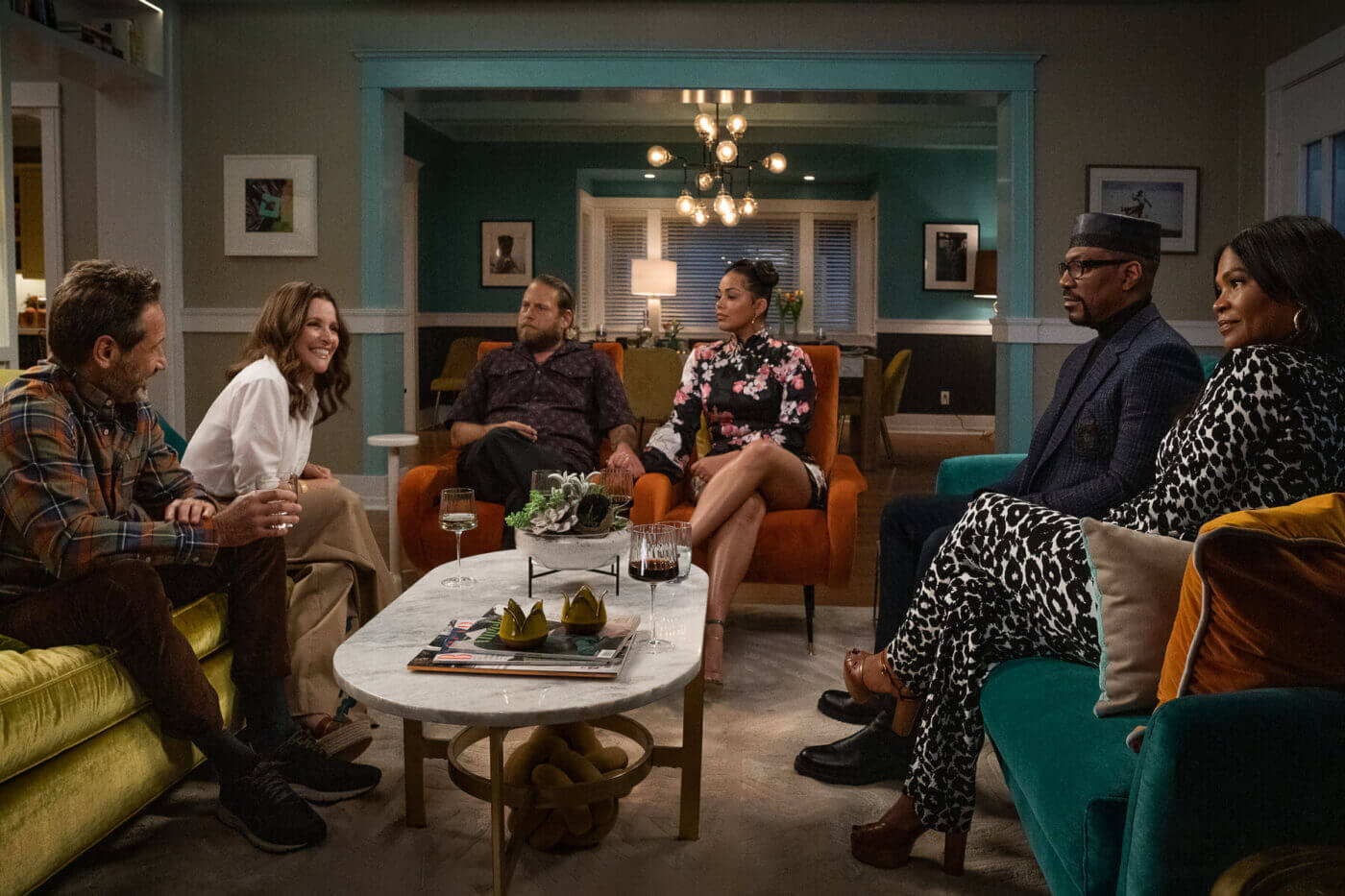YOU PEOPLE. There is no real equality in gold houses

Many film productions have been and still are being made about the extremely tense socio-racial relations in the USA, although so far documentarians have shown greater sensitivity and insight in this field. Kenya Barris, best known for his comedy series Black-ish, has been trying to outweigh the scales in favor of fiction writers for several years. You People is his latest project for Netflix: a comedy about an ethnic couple (Lauren London and Jonah Hill) who have to deal with the obstacles thrown in their way by their families.
The protagonists of You People are Amira, an African-American costume designer from a Muslim family, and Ezra, a broker raised in Judaism and co-creator of a cultural podcast. On the surface, they are people from other planets – ethnically, religiously and culturally, they were shaped in a completely different way, but this does not prevent them from falling in love with each other. They become close, understand each other perfectly and want to plan a life together. Kenya Barris, who together with Jonah Hill also created the screenplay for You People, seems to be asking whether their plans and the desire to create a family are not just a pipe dream, an idealistic illusion that they will never be able to realize. This is because Amira and Ezra do not live in isolation from their cultural heritage – they remain in close relations with their parents, who sabotage the relationship of the two main characters with their behavior at almost every step. Akbar (the great Eddie Murphy), an orthodox Muslim and Amira’s father, does not tolerate the future son-in-law and tries to impose his point of view on him and his family at every turn, while Shelley (the equally great Julia Louis-Dreyfus), Ezra’s mother, tries very hard to be “woke”, and her excessive enthusiasm makes her efforts an absolute caricature.

Relationships between individual characters can also be a caricature – Barris performs a real acrobatics here, trying to create a “social comedy”, and thus at the same time entertain and revise racial tensions, but fails many times in this field. Already the two opening scenes – Ezra’s conversations with his podcast partner Mo (the charismatic Sam Jay) and the visits of the same character to the synagogue – are examples of the exceptional clumsiness of You People dialogue layer. Instead of smooth conversations, we get bumpy exchanges that definitely don’t sound like something real people would say. The world presented in Barris’s film is a reality with which it is difficult to identify – both Amira and Ezra come from very wealthy families, they dress in elite boutiques and play in luxury resorts. Probably the moral that the creators wanted to convey was the statement that no money can protect against prejudice, but setting the action in a world so dripping with luxury made it extremely difficult to empathize with the characters’ situation, which is undoubtedly unenviable.
Related:
You People is an example of an extremely American-centric film – not only because the whole thing deals with racial tensions that have been tormenting the local society for many years, but also because of its rather typical exaggeration in articulating views that fit into political correctness. From the European perspective, many scenes may seem bizarre – I was especially struck by the one in which Ezra offers to help Amira, after all, his beloved, to which she reacts with sincere indignation, accusing her partner of abusing his privileged position … This type of there are much more dialogues in You People, which makes it difficult to consider Barris’s film as a sensible social commentary – from whatever ideological position one looks at it, the exaggerated reactions of each side come to the fore. An overzealously tolerant mother-in-law, a grotesquely orthodox father-in-law, lopsided comments about the “cultural enrichment” of both families – all these flawed elements make the whole film puzzle crack and wobble, and only the occasional moments of genuine closeness that occur between pair of main characters.

The main premise of Kenya Barris’ film – working through racial tensions and drawing attention to the greatest sins of American society – was certainly ambitious and fundamentally sincere, but the execution fell short of these intentions. The creators’ desire cannot be denied, but when the goal is to create an intelligent comedy accurately pointing to social ills, it is difficult to accept an uneven story in which an unconvincing dialogues mix with plot solutions straight from the most cliché romcoms (see the finale of the film). I had hoped that You People would offer us more, amuse us more, make us think more deeply, but instead it seems to teach us only that – to paraphrase Martyna Jakubowicz, Polish singer – “there is no real equality in houses made of gold”.
But we knew that long before this movie was made.





